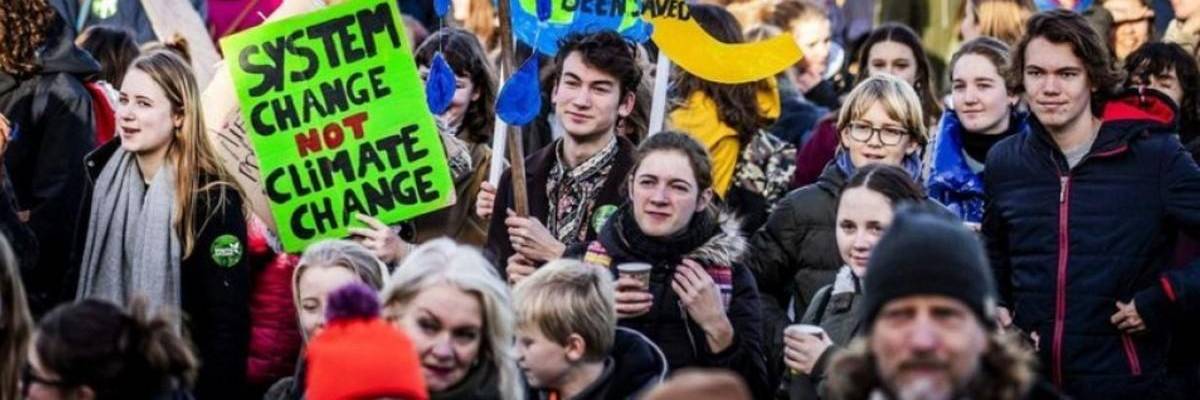

SUBSCRIBE TO OUR FREE NEWSLETTER
Daily news & progressive opinion—funded by the people, not the corporations—delivered straight to your inbox.
5
#000000
#FFFFFF
To donate by check, phone, or other method, see our More Ways to Give page.


Daily news & progressive opinion—funded by the people, not the corporations—delivered straight to your inbox.

If movements can control the conversation through campaigns aimed at the industries themselves, then will we see the beginnings of policy change. (Photo: Remko de Waal/Getty-AFP)
Global movements see young people utilising their power by voicing their grievances, organising in different youth-run climate change organisations, and using all available platforms to make their demands heard and spread.
The Polluters Out's (PO) twitter campaign showed the power of social media in garnering the attention of BP's directors and chief executive.
PO argues that the campaign's pressure helped start a conversation with the very leaders of the corporation, which opened seemingly unimaginable doors.
Change
Action is required--from petitions to campaigns to evidence of the environmental harms produced by such corporations' failures to administer environmentally conscious practices.
Movements can target corporations by disrupting their ability to recruit and retain talent as perfectly exemplified by the Black Lives Matter (BLM) movement's #PullUpOrShutUp campaign which globally calls out corporations on racial inequity and discrimination.
Politicians and governments brush over climate activists because they don't find their demands realistic and credible and the fossil fuel industry has too much influence.
However, if movements can control the conversation through campaigns aimed at the industries themselves, then will we see the beginnings of policy change.
This series of articles has been published in partnership with Dalia Gebrial and Harpreet Kaur Paul and the Rosa Luxemburg Stiftung in London. It first appeared in a collection titled Perspectives on a Global Green New Deal.
Dear Common Dreams reader, The U.S. is on a fast track to authoritarianism like nothing I've ever seen. Meanwhile, corporate news outlets are utterly capitulating to Trump, twisting their coverage to avoid drawing his ire while lining up to stuff cash in his pockets. That's why I believe that Common Dreams is doing the best and most consequential reporting that we've ever done. Our small but mighty team is a progressive reporting powerhouse, covering the news every day that the corporate media never will. Our mission has always been simple: To inform. To inspire. And to ignite change for the common good. Now here's the key piece that I want all our readers to understand: None of this would be possible without your financial support. That's not just some fundraising cliche. It's the absolute and literal truth. We don't accept corporate advertising and never will. We don't have a paywall because we don't think people should be blocked from critical news based on their ability to pay. Everything we do is funded by the donations of readers like you. Will you donate now to help power the nonprofit, independent reporting of Common Dreams? Thank you for being a vital member of our community. Together, we can keep independent journalism alive when it’s needed most. - Craig Brown, Co-founder |
Global movements see young people utilising their power by voicing their grievances, organising in different youth-run climate change organisations, and using all available platforms to make their demands heard and spread.
The Polluters Out's (PO) twitter campaign showed the power of social media in garnering the attention of BP's directors and chief executive.
PO argues that the campaign's pressure helped start a conversation with the very leaders of the corporation, which opened seemingly unimaginable doors.
Change
Action is required--from petitions to campaigns to evidence of the environmental harms produced by such corporations' failures to administer environmentally conscious practices.
Movements can target corporations by disrupting their ability to recruit and retain talent as perfectly exemplified by the Black Lives Matter (BLM) movement's #PullUpOrShutUp campaign which globally calls out corporations on racial inequity and discrimination.
Politicians and governments brush over climate activists because they don't find their demands realistic and credible and the fossil fuel industry has too much influence.
However, if movements can control the conversation through campaigns aimed at the industries themselves, then will we see the beginnings of policy change.
This series of articles has been published in partnership with Dalia Gebrial and Harpreet Kaur Paul and the Rosa Luxemburg Stiftung in London. It first appeared in a collection titled Perspectives on a Global Green New Deal.
Global movements see young people utilising their power by voicing their grievances, organising in different youth-run climate change organisations, and using all available platforms to make their demands heard and spread.
The Polluters Out's (PO) twitter campaign showed the power of social media in garnering the attention of BP's directors and chief executive.
PO argues that the campaign's pressure helped start a conversation with the very leaders of the corporation, which opened seemingly unimaginable doors.
Change
Action is required--from petitions to campaigns to evidence of the environmental harms produced by such corporations' failures to administer environmentally conscious practices.
Movements can target corporations by disrupting their ability to recruit and retain talent as perfectly exemplified by the Black Lives Matter (BLM) movement's #PullUpOrShutUp campaign which globally calls out corporations on racial inequity and discrimination.
Politicians and governments brush over climate activists because they don't find their demands realistic and credible and the fossil fuel industry has too much influence.
However, if movements can control the conversation through campaigns aimed at the industries themselves, then will we see the beginnings of policy change.
This series of articles has been published in partnership with Dalia Gebrial and Harpreet Kaur Paul and the Rosa Luxemburg Stiftung in London. It first appeared in a collection titled Perspectives on a Global Green New Deal.